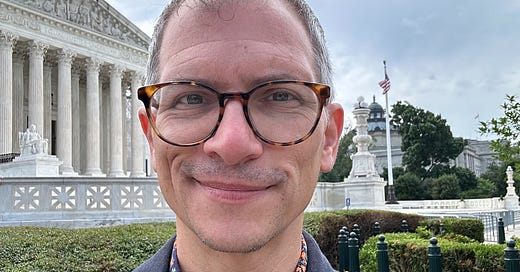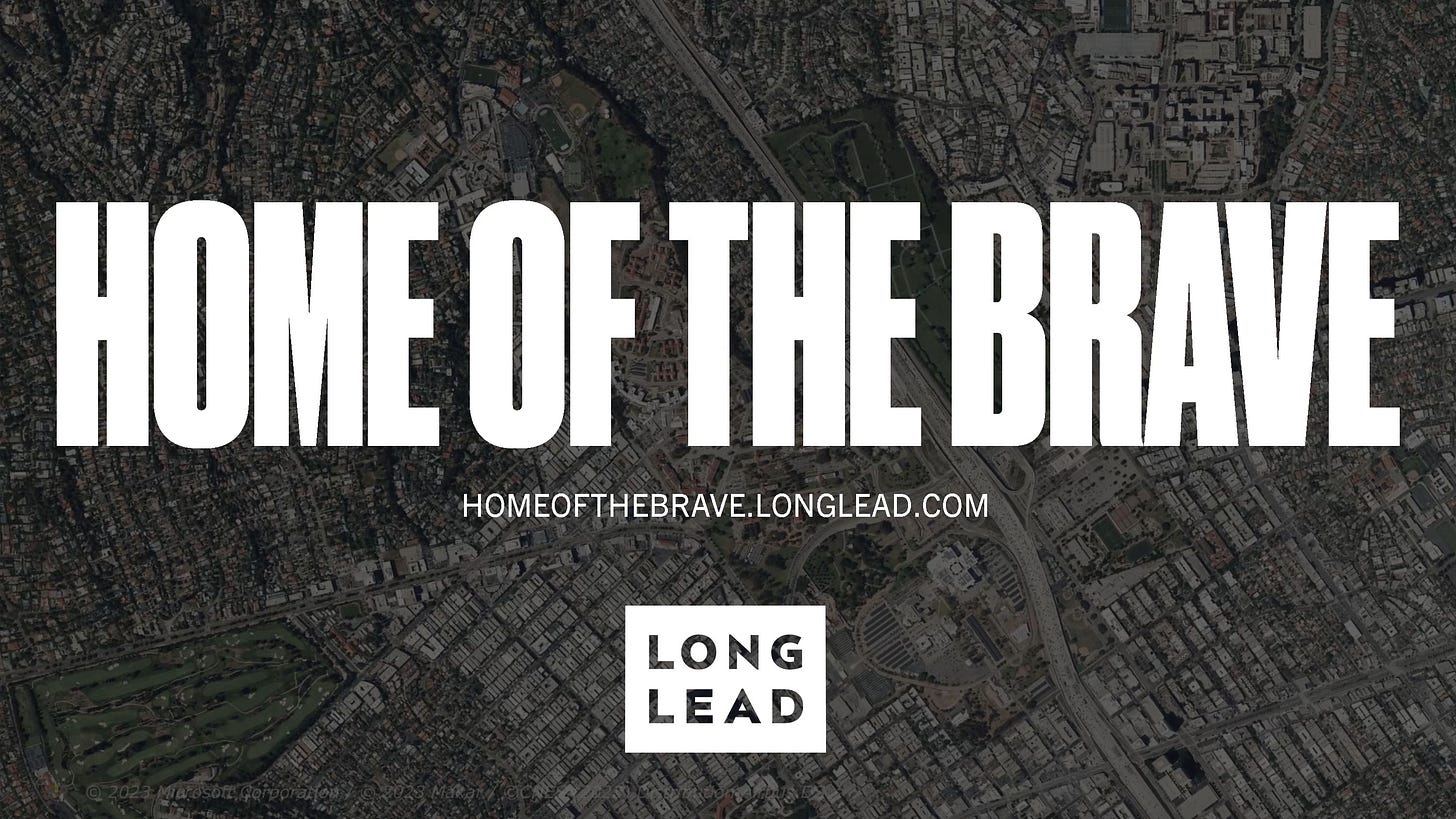Chris Geidner's 'Law Dork' newsletter brings clarity to complex legal issues
The legal journalist discusses Law Dork's mission, the challenges of the media landscape, and why he remains optimistic about the future of journalism.
Chris Geidner has carved out a unique path with Law Dork, a newsletter that's become a beacon for those navigating the complex waters of American jurisprudence. With over 36,000 subscribers, Law Dork isn't just another legal blog; it's a testament to Geidner's commitment to equipping people with knowledge and his knack for translating legalese into compelling narratives that resonate far beyond the courthouse steps.
Geidner's journey from copy editor in Ohio to one of the nation's most respected legal correspondents is a story of adaptability and persistence. His coverage spans the gamut from Supreme Court decisions to LGBTQ rights, criminal justice reform to post-Roe America, always with an eye for the human stories behind the headlines and a dedication to accountability journalism. It's this blend of legal acumen and storytelling that has made Law Dork a go-to source for readers seeking to understand the legal underpinnings of our most pressing debates.
In an era of hot takes, Geidner offers something increasingly rare: thoughtful, in-depth analysis that doesn't sacrifice accessibility for accuracy. Whether he's breaking down a Supreme Court argument or examining the implications of a new state law, Geidner brings a level of clarity and context that's earned him recognition from peers and policymakers alike.
For this edition of Depth Perception, we exchanged emails with Geidner to delve into the ethos behind Law Dork, his approach to legal storytelling, and his thoughts on the challenges and opportunities facing journalism in today's media landscape. —Parker Molloy
Why did you become a journalist?
The vision answer is that I think equipping people with knowledge is one of the most important ways to protect — and improve — our lives. I don't think society works without people putting in that effort to inform. There's too much happening — in our personal lives and in the world around us — for us to keep track of it all, let alone be an expert in everything happening. So, journalism is essential to meeting people where we are and helping us to be as informed as possible about the world around us.
As a practical matter, for me, I want to tell people the things I learn. I'm sure that would have been a part of any career I went into — and it was, for example, when I was a practicing lawyer — but I always come back to journalism as the place where my interests and abilities best fit together to produce the most valuable work for the greatest number of people.
What story of yours are you proudest of?
Pressing the Obama administration for years — across multiple publications — on why they were not taking all of the actions they could take to protect against discrimination based on gender identity. It was an extensive effort that involved literally tracking down cabinet members at public events, making public records requests, and posing nonstop questions, but it was my proudest effort at accountability journalism.
Court is in session: Now hearing an epic government scandal hiding in plain sight
A multi-part, multimedia feature on West LA’s unhoused veteran’s crisis, Home of the Brave, chronicles a land grab dating back to the U.S. Civil War, bursting with government malfeasance, neglect, graft, and even death. At its core, the feature seeks to answer the question: Why are veterans living in the street?
The answer may be found in the courts. Powers v. McDonough, is a class action lawsuit between the federal government and disabled veterans seeking permanent housing on the 388-acre West LA VA campus. Follow the case by subscribing to our daily courtroom briefings, produced by Long Lead, here:
What’s the best journalistic career advice you ever received?
If there’s an ongoing story that you are a respected journalist covering, and people are waiting for your coverage of some big development in that story, take the time to get it right. You don’t always need to be first.
What is the worst journalistic career advice you’ve ever received?
Like a politician, I’m going to answer the question I want to answer here. The worst situation I would want to be in as a journalist is working for an employer who doesn’t value what I bring to my work. A good employer is going to know your skills and, bluntly, take advantage of them to help the company succeed. A bad employer is going to stifle you from doing the things you do best, making you less happy in your job — and resulting in the company getting worse work from you.
As such, the worst career advice you could get — and there are people who would give you this advice — is to keep working for an employer who doesn’t value you and what you bring to your job because, they would say, maintaining “stability in employment” or “relationships across the industry” is essential. Sure, there are financial considerations that might have to be your priority at times and don’t be a jerk about it, but you will not improve your portfolio (or your life) working for an employer who isn’t helping you do your best work. If you can financially deal with it, leaving a bad job to be able to do better work is more important than whatever someone tells you about staying at a job just to have the job.
What is a widely accepted journalistic rule or norm that you hate?
I don’t like the way that significant numbers of publications use anonymous sources. Far, far, far too often, it’s just a way of getting a harsh dig in on someone or some group that the source would never say on the record.
At the same time, and in the opposite direction, some media entities put in place rules to prevent irresponsible anonymous sourcing that ultimately aren’t helpful to that end of informing the reader. If a journalist is (and, depending on circumstances, editor and publication are) confident enough to put their credibility on the line over something that a well-informed source told them, artificial, one-size-fits-all rules limiting or forbidding anonymous sourcing can have the effect of impeding the journalistic endeavor.
To pull that all together, I don’t like overuse of anonymous sources to, essentially, spread gossip, but I do think a lack of named sources shouldn’t be the reason facts and actual information are kept from the public.
What’s one app, tool, or service that you can’t do your work without?
A good CMS. Life after BuzzFeed News has been a true “you don’t know what you’ve got ’til it’s gone” moment. Our CMS was excellent, and I still miss it constantly.
The Substack CMS is good and very workable, but it’s still not home.
More from Long Lead — “Long Shadow: 9/11’s Lingering Questions”
While thorough, large-scale efforts like the 9/11 Commission tried to make sense of the deadliest terrorist attack in American history, many questions remain.
Hosted by Pulitzer-finalist historian Garrett Graff, “Long Shadow: 9/11’s Lingering Questions” attempts to answer those questions and explore other enduring mysteries surrounding 9/11. A number one-ranked history podcast on Apple Podcasts, “Long Shadow” was named the best history podcast by the Signal Awards. Listen and subscribe to the Long Lead-produced podcast at www.longshadowpodcast.com.
What makes you think journalism is doomed? Or is it not?
I think we need to figure out how to pay for careful, smart journalism. And, with a handful of exceptions, we really haven’t. We have found moments when we get it — sort of — to work, and we see great things in those moments, but it’s always teetering on the edge.
I really wish it weren’t like that. But I don’t think that that leads me to a view that journalism is doomed.
The fact that we keep trying — and that people keep coming up with new ideas (or even re-creating the wheel again to try something over in a slightly different way) — shows that there is energy and desire to make journalism that works.
The reality that there are constantly new publications and new entities and new platforms is exciting. I can question the fundamentals of some of them (and I have), but that doesn’t change how good it is for journalism — and the public — that people keep trying.
What makes you feel hopeful for the future of journalism?
I mean, I’m here. More than two years into Law Dork, and people are still subscribing every day — all over the country and, for some reason, world. So, that’s good and hopeful.
Right?
MORE READING FROM CHRIS GEIDNER:
“SCOTUS conservatives made clear they will consider anything. The right heard them.” (Law Dork, Jul. 25, 2024)
“The spinelessness of John Roberts” (Law Dork, Jul. 3, 2024)
“Sam Alito is a problem” (Law Dork, May 23, 2024)
“Exclusive: Justice Alito sold Bud Light stock amidst anti-trans boycott effort” (Law Dork, May 19, 2024)
“How The Obama Administration Delayed Transgender Workers’ Protections For Years” (BuzzFeed, Oct. 26, 2016)










